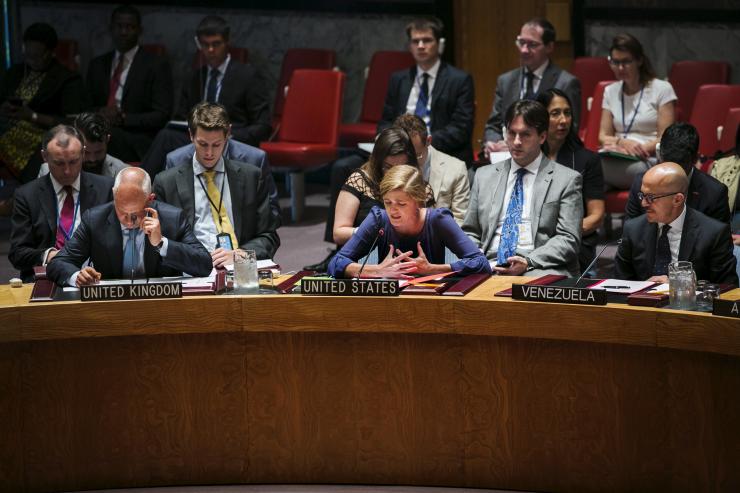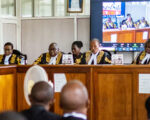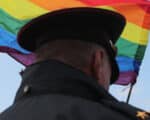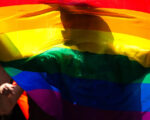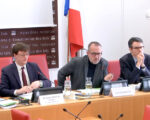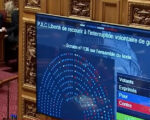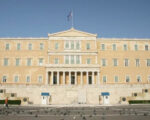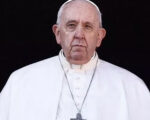>> ISIS LGBT Persecution: At UN Security Council Meeting, Gay Islamic State Victims In Syria And Iraq Discussed
[spacer]
Les membres du Conseil de sécurité de l’ONU ont entendu lundi les témoignages horrifiants des persécutions subies par des gays irakiens et syriens aux mains du groupe Etat Islamique (EI), lors d’une première réunion jamais consacrée aux droits des homosexuels : «Dans l’Etat Islamique, les gays sont traqués et tués tout le temps», a témoigné Subhi Nahas, originaire d’Idlib, dans le nord-ouest de la Syrie, région dévastée par la guerre.
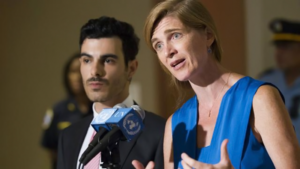 Les homosexuels sont jetés des toits et lapidés par des foules en liesse qui réagissent, y compris les enfants, comme s’ils étaient «à un mariage», a raconté l’homme qui a fui les persécutions dans son pays et travaille désormais pour une organisation d’aide aux réfugiés aux Etats-Unis.
Les homosexuels sont jetés des toits et lapidés par des foules en liesse qui réagissent, y compris les enfants, comme s’ils étaient «à un mariage», a raconté l’homme qui a fui les persécutions dans son pays et travaille désormais pour une organisation d’aide aux réfugiés aux Etats-Unis.
Les militants de l’EI «traquent les gays de façon professionnelle. Ils les chassent un par un», a aussi témoigné un Irakien, qui s’exprimait par téléphone depuis un lieu tenu secret au Proche-Orient. «Quand ils capturent quelqu’un, ils inspectent son téléphone, ses contacts et ses amis sur Facebook», a ajouté l’homme qui se fait appeler Adnan pour éviter son vrai nom, par crainte d’être reconnu. Il a expliqué avoir été victime de brutalités de la part des forces de sécurité irakiennes avant l’arrivée de l’EI dans sa ville. Craignant que sa famille ne le livre aux jihadistes, il a fui. «Ils tentent de traquer tous les hommes gays. Et c’est comme un effet domino. Si un tombe, les autres tomberont aussi», a-t-il confié.
Les combattants de l’EI ont revendiqué au moins 30 exécutions pour «sodomie», a indiqué Jessica Stern, directrice de la Commission internationale des droits des gays et lesbiennes, aux participants à la réunion qui se déroulait à huis clos.
[spacer]
[spacer]
Le groupe jihadiste a diffusé au moins sept vidéos ou photos en ligne montrant des exécutions de personnes qu’ils accusent d’être homosexuelles depuis juillet 2014, a-t-elle précisé après la réunion. L’Observatoire syrien des droits de l’homme (OSDH) a rapporté en juillet que des combattants de l’EI avaient jeté deux hommes qu’ils accusaient d’être homosexuels du haut d’un immeuble à Palmyre, en Syrie, avant de les lapider.
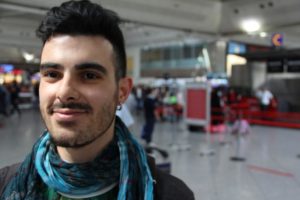 C’est la première fois que le Conseil de sécurité se réunit pour parler des droits des homosexuels, un moment «historique», selon l’ambassadrice américaine à l’ONU Samantha Power. «Il était temps, 70 ans après la création de l’ONU, que le sort des personnes LGTB qui craignent partout dans le monde pour leur vie, soit porté sur le devant de la scène», a-t-elle déclaré.
C’est la première fois que le Conseil de sécurité se réunit pour parler des droits des homosexuels, un moment «historique», selon l’ambassadrice américaine à l’ONU Samantha Power. «Il était temps, 70 ans après la création de l’ONU, que le sort des personnes LGTB qui craignent partout dans le monde pour leur vie, soit porté sur le devant de la scène», a-t-elle déclaré.
Organisée par les Etats-Unis et le Chili, la réunion était ouverte à tous les membres du Conseil de sécurité mais l’Angola et le Tchad n’y ont pas participé.
Subhi Nahas a appelé devant le Conseil les gouvernements à accueillir ces victimes «pour qu’elles puissent à nouveau connaître la sécurité».
Les Etats-Unis sont à la tête d’une coalition internationale luttant contre le groupe EI, qui contrôle de larges pans de territoires en Irak et en Syrie.
[spacer]
>> Subhi Nahas, an openly gay Syrian refugee now living in the United States, says he fled homophobic brutality in his homeland.
He told his story Monday to the United Nations Security Council in the panel’s first-ever briefing on attacks against LGBT people in the Middle East by militants from the Islamic State group, also known as ISIS or ISIL.
Speaking in New York City to the U.N.’s key panel for international peace and security, Nahas said many of his lesbian, gay, bisexual and transgender friends have not escaped persecution by militants — and that stopping the attacks requires immediate global intervention.
“My friends are feeling alone and terrified living in places where people who don’t fit into what others deem as ‘normal,’ are being persecuted and killed simply for who they are and what they believe,” said Nahas, who resettled in the U.S. with help from an international organization that tracks anti-LGBT violence on refugees.
“I’m receiving messages daily from my friends, who are terrified and feeling alone because of ISIL’s constant attacks, murders and infiltration, and shutting off of the one escape route to safety in Turkey,” Nahas said in a statement delivered to the council Monday morning.
While it was not the first time the persecution of gays and lesbians has been mentioned before the 15-member council that includes the U.S., Britain, China, France and Russia as permanent members, the panel had never convened to talk specifically about attacks on LGBT people anywhere in the world. The Security Council has previously discussed the impact of Islamist terrorism on global peace, but acknowledging sexual minorities in this way was an “important step” for expanding human rights, said Samantha Power, the U.S. ambassador to the U.N., who sponsored the meeting with her diplomatic counterpart from Chile.
Before his 2012 escape from Syria to Lebanon, Nahas had been on his way to college to study English translation when he was arrested and physically assaulted by Syrian soldiers, according to the Organization for Refugee, Asylum and Migration (ORAM), the nonprofit that helped him resettle in the U.S. Although the soldiers inexplicably allowed him to leave, hundreds of other people accused of being homosexual have been killed by ISIS militants, advocates said.
Militants released video footage that showed soldiers in June throwing four purportedly gay men from the roof of a tall building in the Syrian city of Deir ez-Zor, Britain’s Mirror reported. Neil Grungras, founder of ORAM and an expert on LGBT refugees, told the council that it was in a position to support to gay and lesbian Syrians and Iraqis who are at constant risk of meeting a similar fate.
“It’s particularly important that this event is hosted by the U.N. Security Council,” Grungras said in a statement delivered to council members. “Of the millions of LGBTI people who face human rights abuses each year, only a handful manage to escape and become refugees. It is up to the nations of conscience represented here today to open their doors and give these refugees the safety they need.” [The LGBTI acronym adds the term “intersex,” referring to individuals who possess both male and female characteristics.]
Subhi Nahas, an openly gay Syrian refugee, told the U.N. Security Council Monday that he was arrested in Syria and assaulted by Islamist State militants because of his sexual orientation. ORAM
Jessica Stern, executive director of the International Gay and Lesbian Human Rights Commission, said U.N. agencies that are assisting refugees in Iraq and Syria should have programming that is tailored to LGBT individuals. The council should also pressure regional government leaders to make it easier for those fleeing persecution to access services and sanctuary in neighboring countries, Stern said in a statement to members.
“The international community must understand anti-LGBTI persecution as a component of how ISIS treats those it labels as ‘impure,’” Stern said. “We must recognize that these threats exist on a continuum of violence and discrimination before, during, and after [civil] conflict.”
AFP


